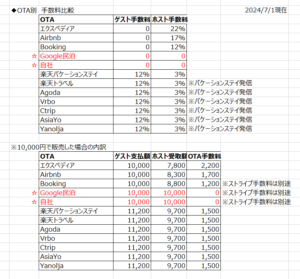タグ:札幌民泊
-
Fee Comparison
OTA stands for Online Travel Agent, referring to travel agencies that conduct business exclusively on the internet.The main characteristics of OTAs are as follows:
- Internet-only: They operate without physical stores, providing services only online.
- Products offered: They typically handle hotel reservations, flight bookings, dynamic packages (combining accommodation and flights), travel insurance, etc.
- Convenience: Consumers appreciate the ability to browse and search numerous products 24/7.
- Notable OTAs: Examples include Jalan, Rakuten Travel, Booking.com, etc.
- Market scale: In Japan, the online booking rate for accommodations is high, with about 44% of reservations made online as of 2018.
- Benefits: OTAs offer opportunities to approach new customer segments and increase brand awareness.
Unlike traditional travel agencies, OTAs primarily invest in systems, which allows for entry from industries outside of travel. Meanwhile, conventional travel agencies are focusing on cross-channel sales, combining their own websites with physical stores and telephone sales.As the use of OTAs continues to increase, it’s becoming increasingly important for accommodation providers to effectively utilize these platforms.OTAs differ from traditional travel agencies in that their main investment is in systems, leading to many entries from non-travel industries. On the other hand, conventional travel agencies are focusing on cross-channel sales, combining their own websites with physical stores and telephone sales.With the growing trend of OTA usage, it’s becoming increasingly important for accommodation providers to effectively utilize OTAs.]

-
Differences Between Vacation Rentals and Hotels
4o -
Criteria for Loans When Foreigners Purchase Real Estate in Japan
Here are the criteria for applying for a loan when a foreigner purchases real estate in Japan:
- Date of Birth
- Name of the company where you work
- Can you communicate in Japanese?
- The contract is only available in Japanese. Can you understand it?
- How much self-funding do you have?
For taking out a loan:
- Interest rate: Around 1.5% to 2%
- Variable interest rate
- Maximum term: 35 years
- Mortgage insurance is mandatory
-
札幌民泊ノート【後編】
こんにちは。 札幌民泊ノート【後編】です。
念願の予約を獲得し、いざゲストをお迎えです! とはいっても、民泊は無人施設のためゲストと直接対面する機会はあまりありません。
ゲストは事前にオンラインチェックインを済ませ、チェックインガイドを入手します。 チェックインガイドには、鍵の取得方法やお部屋のルールなどが記載されているため、直接現地に向かいます。 支払はOTA経由の予約であればサイトを通じて既に完了しているため、現金のやり取りはありません。 チェックイン後にOTA経由にてホストに振込がされる仕組みです。ほとんどのゲストはトラブルなくスムーズにセルフチェックインを完了させ、チェックアウトまでそれぞれの滞在を楽しみます。 ゲストがチェックアウトした後は、清掃を行い次のゲストを迎える準備を整えます。
このように民泊は予約からチェックアウトまでがオンライン上で完結するとても便利な仕組みとなっています。
ホストの中には、一緒にご飯に行ったり、オススメのレジャーを楽しんだりとされている方もいらっしゃいます。 ゲストと交流することは、札幌や日本の魅力をアピールする絶好の機会ですよね。
ゲストがチェックアウトした後は、ゲストは口コミを残したり、ゲスト、ホスト双方に評価し合うレビューがあります。 ここであまりよくない口コミ評価をもらってしまうと大変です。 何度も続くとOTAに一時的に掲載されなくなったり、永久退場させられてしまうこともありますので、 お部屋のメンテナンスを欠かしてはいけません。 ホストとしては精一杯おもてなしする気持ちを忘れずに、世界中のゲストに札幌滞在を楽しんでもらいたいです! -
【札幌民泊ノート】(前編)
◆初めての民泊運営~届出から登録まで◆
こんにちは。今日は民泊を始めるにあたっての作業について書いてみたいと思います。
まず、民泊って何だろう?について。
【民泊とは宿泊用に提供された個人宅や空き物件に泊まること】を指します。
おうちにゲストを招き入れることとしては、ホームステイなどがイメージしやすいかと思いますが、民泊は家主がいないお部屋も多くありますし、収益を得ることが可能になります。
もちろん、交流する事が大好きだからホストとして観光客を自宅に招き入れ、空いている1室を民泊として提供しながら一緒に過ごす、という方もいらっしゃいますが、今日は空き部屋を借り上げて民泊を営むことについて書いていきます。
では、実際に民泊を始めたい!と思った時、何から始めたらよいでしょうか。
まず、お住いの市区町村に許可申請を行います。
そのお部屋で民泊を行ってよいか、建物オーナーに承諾をもらったり、消防法令に適しているか消防署に許可をもらったり、部屋の細かな図面を提出してゲストを迎え入れるに適しているか判断してもらうことになります。また、何かトラブルがあった際の窓口として民泊管理会社として許可を受けた会社と契約をする事も必須となります。
さらに、民泊は遊休不動産の活用という目的があることから、住む人がいない間だけ民泊としてそのお部屋を活用する、ということが必要になります。あくまでもアパートやマンションは居住する人向けのスペースなので、民泊部屋として営業し続けるということはNGとなります。
そのため、そのお部屋が現在空室であり、借主を募集している状態であることが条件となります。(なかなかの肩身の狭さです…)札幌市の場合、書類一式提出し不備がなければ1か月ほどで許可がおり、晴れて民泊事業者となることができます。
許可証となる民泊プレートが送付されるので、それをお部屋の玄関に貼り付けて、近所の方にも民泊を営んでいるとことを周知します。その際、ご近所さんにご挨拶に行かれるとよいでしょう。
何かあった際は、こちらに電話してくださいと契約管理会社の連絡先をお伝えするなどしておくと、ご近所さんも安心ですし、ゲストが困っているときに助けてくれたりすることもあります。
ご近所さんとは良好な関係を築いておきたいところです。次に、そのお部屋をどうやって売り出すか?について。
現在では色々な予約サイトがありますが、Airbnbというサイトをご存知でしょうか?借りたい人と貸したい人を結びつける役割を持つサイトで、多くの民泊ホストがお部屋を掲載し、ゲストを迎え入れ収益を得ています。民泊の先駆的存在のサイトです。他にもBooking.comや楽天バケーションステイ、エクスペディア、agodaなど数多くのサイトで民泊部屋を予約する事が可能です。
お部屋を掲載するには、アカウントを作成し、お部屋の写真や紹介文、周辺情報などを入力してリスティングとよばれるお部屋の紹介ページを作成します。
価格を入力し、公開ボタンを押せばサイト上にお部屋が掲載されます。
ここで大切になるのが【写真】と【口コミ】です。
数多くのお部屋の中からこの部屋を予約したい!と思ってもらうためには、より魅力的な写真や多くの口コミを集めることが予約の決め手となります。
また、ゲストから質問が届いたとき、スムーズに返答できるかも大切です。
これらのサイトのほとんどは、サイト上のメッセージ機能でゲストとのやり取りが行われます。
ゲストの不安や不満は全てメッセージ上で行われます。
そのため、専任の担当者を雇っている場合も多くあります。筆者はこのメッセージ担当業務というものに携わった経験がありますが、昼夜を問わず様々な質問が届きます。
「鍵の受け渡しはどうするのか」「滞在中のゴミはどうしたらいいか」「調理は可能か」「子供は泊まれるか」・・・などなどです。
リスティングが詳細で完璧であれば、これらの質問は激減します。
いかに効率的にゲストに滞在していただくかということを考えて、最初のリスティングを充分に作り込む事をお薦めします。
長すぎる文章や説明文は読む気がしません。文字と写真を使い分けながら、見やすくスマートなリスティングページを作りましょう。
販売カレンダーについては、繁忙期や閑散期など価格を変更することは自由に行えますし、ご自身で民泊部屋を利用したいときはカレンダーをクローズすることも可能です。
一連の掲載作業が終了したら、あとはゲストからの連絡を待つだけ。
後編はいよいよ予約が入りました!さあゲストを迎えましょう!です。